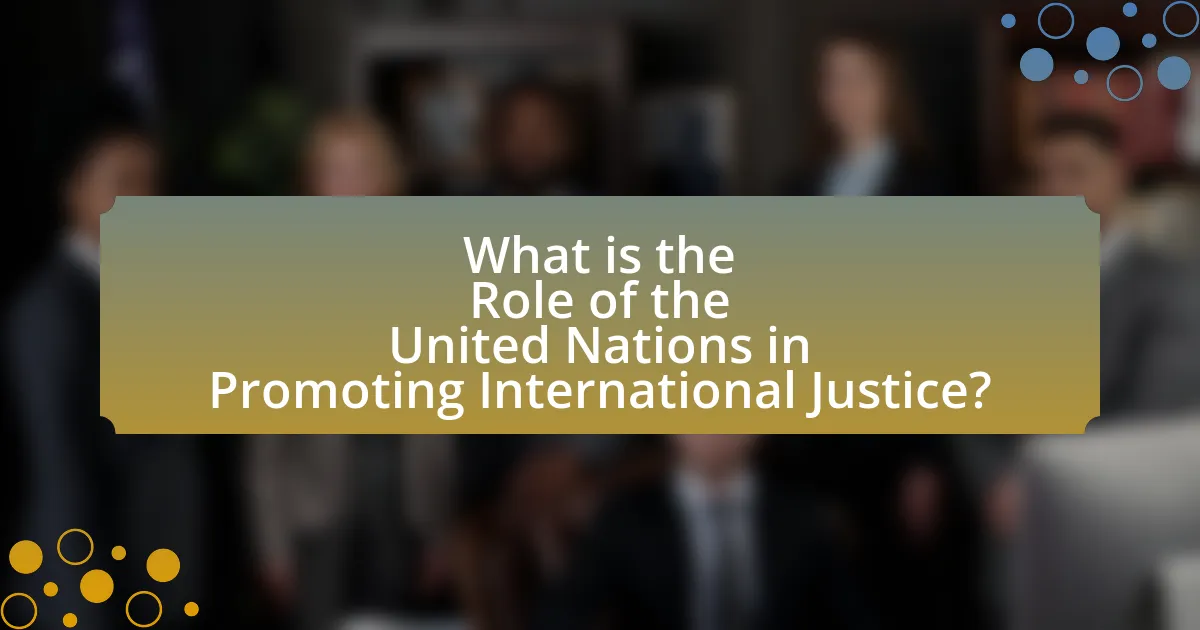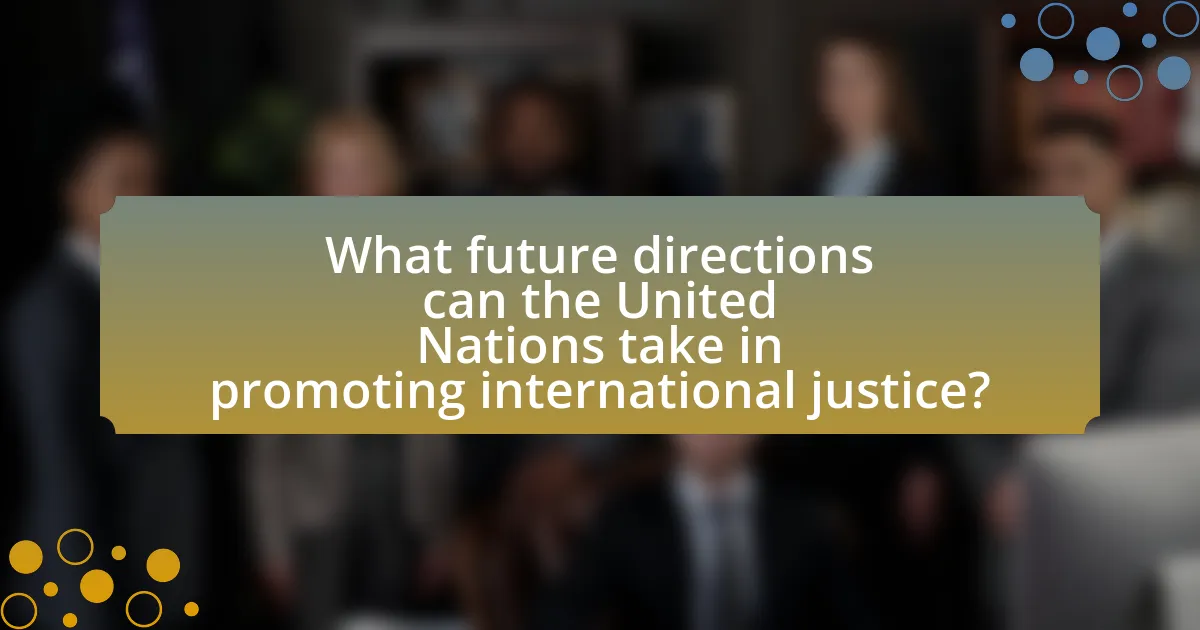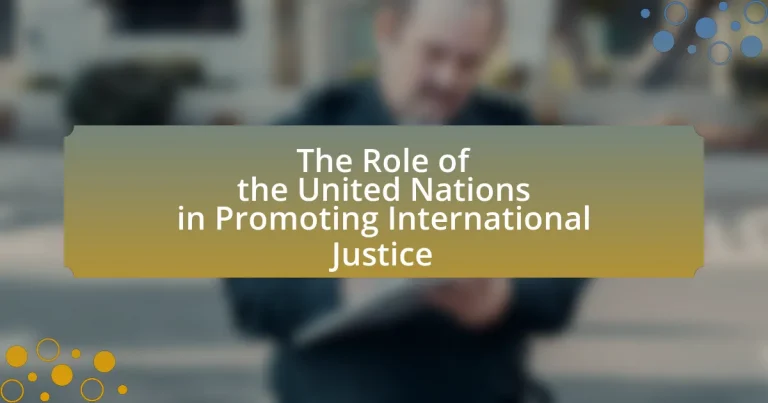The United Nations (UN) plays a pivotal role in promoting international justice through various mechanisms and institutions, including the establishment of legal standards and international tribunals. It defines international justice as a framework for accountability regarding serious violations of international law, emphasizing principles such as accountability, fairness, and the rule of law. The UN collaborates with member states and other organizations to implement justice initiatives, while also facing challenges related to state sovereignty and political will. The article explores the UN’s mechanisms for promoting justice, its impact on global legal standards, and the future directions it can take to enhance its effectiveness in addressing emerging global justice challenges.

What is the Role of the United Nations in Promoting International Justice?
The United Nations plays a crucial role in promoting international justice through its various mechanisms and institutions. It establishes international legal standards, such as the Universal Declaration of Human Rights and the International Criminal Court, which hold individuals accountable for crimes like genocide and war crimes. The UN also facilitates peacekeeping missions and conflict resolution efforts, aiming to create stable environments where justice can be pursued. Additionally, the UN conducts investigations into human rights violations and supports transitional justice initiatives in post-conflict societies, thereby reinforcing the rule of law globally.
How does the United Nations define international justice?
The United Nations defines international justice as a framework aimed at ensuring accountability for serious violations of international law, including war crimes, genocide, and crimes against humanity. This definition is rooted in the UN’s commitment to uphold human rights and promote peace and security globally, as articulated in the UN Charter and various international treaties. The establishment of international tribunals, such as the International Criminal Court, exemplifies the UN’s efforts to implement this definition by providing mechanisms for prosecution and redress for victims of such crimes.
What are the key principles underlying international justice according to the UN?
The key principles underlying international justice according to the UN include accountability, fairness, and the rule of law. Accountability ensures that individuals and states are held responsible for violations of international law, particularly in cases of war crimes and crimes against humanity. Fairness emphasizes the need for impartiality and equality before the law, ensuring that all parties receive just treatment. The rule of law establishes that laws apply equally to all individuals, promoting justice and preventing arbitrary governance. These principles are enshrined in various UN documents, including the Universal Declaration of Human Rights and the Rome Statute of the International Criminal Court, which collectively reinforce the UN’s commitment to uphold justice on a global scale.
How does the UN’s definition of justice differ from national interpretations?
The UN’s definition of justice emphasizes universal human rights and accountability, contrasting with national interpretations that may prioritize sovereignty and local customs. The UN framework, established in documents like the Universal Declaration of Human Rights, advocates for justice that transcends borders and cultural differences, aiming for a consistent application of human rights standards globally. In contrast, national interpretations often reflect specific legal systems, cultural values, and political contexts, which can lead to variations in how justice is administered. For example, while the UN promotes the right to a fair trial as a fundamental principle, some nations may have legal practices that do not fully align with this standard, resulting in disparities in justice outcomes.
What mechanisms does the United Nations use to promote international justice?
The United Nations promotes international justice through various mechanisms, including the establishment of international tribunals, the International Criminal Court (ICC), and the implementation of peacekeeping missions. International tribunals, such as those for the former Yugoslavia and Rwanda, were created to prosecute war crimes and crimes against humanity, thereby reinforcing accountability. The ICC, established by the Rome Statute in 2002, serves as a permanent court to prosecute individuals for genocide, war crimes, and crimes against humanity, further solidifying the UN’s commitment to justice. Additionally, UN peacekeeping missions often include mandates to protect civilians and support the rule of law, which contributes to the establishment of justice in post-conflict societies. These mechanisms collectively enhance the UN’s role in fostering accountability and upholding international legal standards.
What are the main bodies of the UN involved in international justice?
The main bodies of the UN involved in international justice are the International Court of Justice (ICJ), the International Criminal Court (ICC), and the United Nations Security Council (UNSC). The ICJ adjudicates disputes between states and provides advisory opinions on legal questions referred to it by the UN General Assembly or Security Council. The ICC prosecutes individuals for crimes such as genocide, war crimes, and crimes against humanity, functioning independently but with a relationship to the UN. The UNSC plays a crucial role in maintaining international peace and security, often referring situations to the ICC and establishing tribunals for specific conflicts, such as the International Criminal Tribunal for the former Yugoslavia (ICTY) and the International Criminal Tribunal for Rwanda (ICTR).
How do UN treaties and conventions contribute to international justice?
UN treaties and conventions contribute to international justice by establishing legal frameworks that promote accountability, human rights, and the rule of law across nations. These legal instruments, such as the International Covenant on Civil and Political Rights and the Convention Against Torture, set binding obligations for states to uphold fundamental rights and prevent abuses. For instance, the Rome Statute of the International Criminal Court enables the prosecution of individuals for war crimes, genocide, and crimes against humanity, thereby reinforcing the principle that perpetrators cannot escape justice. Additionally, these treaties facilitate international cooperation and dialogue, enabling countries to work together in addressing violations and ensuring compliance with international standards.
Why is the United Nations’ role in international justice significant?
The United Nations’ role in international justice is significant because it establishes legal frameworks and institutions that promote accountability for war crimes, genocide, and crimes against humanity. The UN created the International Criminal Court and various tribunals, such as those for the former Yugoslavia and Rwanda, which have prosecuted individuals for serious violations of international law. These actions reinforce the principle that individuals, including state leaders, can be held accountable for their actions, thereby deterring future atrocities and fostering a culture of justice and human rights globally.
What impact does the UN have on global legal standards?
The United Nations significantly influences global legal standards through the establishment of international treaties, conventions, and norms that member states are encouraged to adopt. For instance, the UN’s Universal Declaration of Human Rights, adopted in 1948, set a foundational framework for human rights that has inspired numerous international and national laws. Additionally, the UN’s International Law Commission works to develop and codify international law, further shaping legal standards worldwide. The UN also plays a crucial role in monitoring compliance and providing a platform for dispute resolution, thereby reinforcing the importance of adhering to established legal norms among nations.
How does the UN address violations of international justice?
The United Nations addresses violations of international justice primarily through its mechanisms for accountability, including the establishment of international tribunals and the implementation of sanctions. The UN Security Council can refer cases to the International Criminal Court (ICC) and has set up ad hoc tribunals, such as those for the former Yugoslavia and Rwanda, to prosecute individuals for war crimes and genocide. Additionally, the UN conducts investigations into alleged violations, as seen in the Human Rights Council’s commissions of inquiry, which gather evidence and report on abuses. These actions are grounded in the UN Charter and various international treaties, reinforcing the organization’s commitment to uphold justice and accountability on a global scale.
How does the United Nations collaborate with other organizations in promoting justice?
The United Nations collaborates with other organizations in promoting justice through partnerships and joint initiatives that enhance legal frameworks and support human rights. For instance, the UN works closely with the International Criminal Court (ICC) to address war crimes and crimes against humanity, facilitating investigations and prosecutions. Additionally, the UN collaborates with regional organizations, such as the African Union and the European Union, to implement justice-related programs and share best practices in legal reform. This collaboration is evidenced by joint resolutions and reports, such as the UN’s “Global Plan of Action to Combat Trafficking in Persons,” which involves multiple stakeholders in addressing human trafficking and ensuring accountability.
What challenges does the United Nations face in its pursuit of international justice?
The United Nations faces significant challenges in its pursuit of international justice, primarily due to issues of state sovereignty, political will, and resource limitations. State sovereignty often leads to reluctance among member states to cooperate with international legal mechanisms, as seen in cases where nations refuse to extradite individuals wanted by international courts. Political will is frequently lacking, as powerful nations may prioritize their interests over justice, undermining accountability for war crimes and human rights violations. Additionally, the UN’s resources are often insufficient to effectively investigate and prosecute international crimes, as highlighted by the limited funding for the International Criminal Court, which affects its operational capacity. These challenges collectively hinder the UN’s ability to enforce international justice effectively.
What are the outcomes of the United Nations’ efforts in international justice?
The outcomes of the United Nations’ efforts in international justice include the establishment of international tribunals, the promotion of human rights, and the development of legal frameworks for accountability. The International Criminal Court (ICC), created by the Rome Statute in 2002, exemplifies the UN’s commitment to prosecuting war crimes, genocide, and crimes against humanity, with over 40 cases initiated since its inception. Additionally, the UN has facilitated the establishment of ad hoc tribunals, such as the International Criminal Tribunal for the former Yugoslavia (ICTY) and the International Criminal Tribunal for Rwanda (ICTR), which have contributed to transitional justice and reconciliation in post-conflict societies. Furthermore, the UN’s Universal Declaration of Human Rights has set a global standard for human rights, influencing national laws and international treaties. These outcomes demonstrate the UN’s significant role in shaping international justice norms and practices.
How effective has the UN been in resolving international conflicts?
The United Nations has been moderately effective in resolving international conflicts, with varying degrees of success across different situations. For instance, the UN facilitated the end of the civil war in El Salvador through the 1992 Peace Accords, which were supported by UN mediation and monitoring. However, in other cases, such as the ongoing Syrian conflict, the UN has struggled to achieve a resolution due to geopolitical complexities and lack of consensus among member states. The UN’s peacekeeping missions, which have been deployed in over 70 conflicts since 1948, demonstrate its commitment to conflict resolution, yet their effectiveness often depends on the cooperation of conflicting parties and the mandate given by the Security Council.
What case studies illustrate the UN’s success in promoting justice?
The United Nations has successfully promoted justice through various case studies, notably the establishment of the International Criminal Tribunal for the former Yugoslavia (ICTY) and the International Criminal Court (ICC). The ICTY, created in 1993, prosecuted war crimes committed during the Balkan conflicts, leading to significant legal precedents and accountability for perpetrators, including the conviction of former Bosnian Serb leader Radovan Karadžić in 2016 for genocide and crimes against humanity. Similarly, the ICC, established in 2002, has addressed crimes such as genocide and war crimes in various countries, including the conviction of Congolese warlord Thomas Lubanga in 2012 for enlisting child soldiers. These case studies exemplify the UN’s role in fostering international justice and establishing legal frameworks that hold individuals accountable for serious crimes.
What lessons have been learned from the UN’s failures in international justice?
The lessons learned from the UN’s failures in international justice include the necessity for stronger enforcement mechanisms and the importance of timely intervention. The UN has faced criticism for its inability to prevent genocides and war crimes, as seen in the Rwandan Genocide of 1994, where inaction led to the deaths of approximately 800,000 people. Additionally, the lack of accountability for perpetrators has highlighted the need for more robust legal frameworks and cooperation among member states to ensure justice is served. These failures underscore the importance of proactive measures and the establishment of clear mandates for peacekeeping missions to effectively address human rights violations.
What role do member states play in supporting the UN’s justice initiatives?
Member states play a crucial role in supporting the UN’s justice initiatives by providing financial resources, political backing, and implementing international legal standards domestically. These states contribute to the UN’s budget, which funds various justice programs, including the International Criminal Court and peacekeeping missions that uphold human rights. For instance, in 2021, member states collectively contributed over $3 billion to UN peacekeeping operations, which often include justice-related mandates. Additionally, member states are responsible for enacting and enforcing international treaties and resolutions, thereby ensuring that the principles of justice promoted by the UN are integrated into national legal systems. This collaboration enhances the effectiveness of the UN’s efforts to promote accountability and rule of law globally.
How do national policies align with UN justice objectives?
National policies align with UN justice objectives by incorporating international legal standards and human rights principles into domestic legislation. Many countries adopt frameworks that reflect the UN’s Sustainable Development Goals, particularly Goal 16, which emphasizes the promotion of peaceful and inclusive societies, access to justice, and the establishment of effective, accountable institutions. For instance, nations often ratify UN treaties, such as the International Covenant on Civil and Political Rights, which obligates them to uphold justice and protect individual rights. This alignment is evidenced by the increasing number of national laws that address issues like human trafficking, corruption, and discrimination, mirroring the UN’s commitment to justice and accountability.
What responsibilities do member states have in upholding international justice?
Member states have the responsibility to uphold international justice by adhering to international treaties, cooperating with international courts, and ensuring accountability for crimes such as genocide, war crimes, and crimes against humanity. This obligation is rooted in various international legal frameworks, including the Rome Statute of the International Criminal Court, which mandates states to prosecute or extradite individuals accused of serious offenses. Additionally, member states are expected to support the work of the United Nations and its mechanisms, such as the Human Rights Council, to promote justice and protect human rights globally.

What future directions can the United Nations take in promoting international justice?
The United Nations can enhance its promotion of international justice by strengthening its mechanisms for accountability and expanding its support for transitional justice processes. By establishing more robust frameworks for investigating and prosecuting war crimes and crimes against humanity, the UN can ensure that perpetrators are held accountable, as evidenced by the establishment of the International Criminal Court in 2002, which aims to prosecute individuals for such offenses. Additionally, the UN can promote restorative justice initiatives that focus on reconciliation and healing in post-conflict societies, as seen in various peace agreements that incorporate truth commissions. These directions not only align with the UN’s mission to uphold human rights but also respond to the increasing demand for justice from affected communities globally.
How can the UN adapt to emerging global justice challenges?
The UN can adapt to emerging global justice challenges by enhancing its mechanisms for conflict resolution and increasing collaboration with regional organizations. This adaptation is crucial as global justice challenges, such as human rights violations and transnational crimes, have become more complex and interconnected. For instance, the UN’s establishment of the Responsibility to Protect (R2P) doctrine illustrates its commitment to addressing humanitarian crises, while partnerships with organizations like the African Union have proven effective in managing regional conflicts. Furthermore, the UN can leverage technology and data analytics to monitor human rights abuses in real-time, thereby enabling quicker responses to emerging threats. This proactive approach is supported by the UN’s ongoing efforts to reform peacekeeping operations and strengthen the International Criminal Court’s jurisdiction, ensuring accountability for perpetrators of serious crimes.
What innovations in international law could enhance the UN’s effectiveness?
Innovations in international law that could enhance the UN’s effectiveness include the establishment of a global digital governance framework and the integration of artificial intelligence in conflict resolution processes. A global digital governance framework would address issues such as cybersecurity, data privacy, and digital rights, which are increasingly relevant in a globalized world. This framework could facilitate international cooperation and compliance, thereby strengthening the UN’s role in maintaining peace and security.
Additionally, the integration of artificial intelligence in conflict resolution could improve the UN’s ability to analyze data and predict potential conflicts, allowing for proactive measures rather than reactive responses. For instance, AI can analyze social media trends and economic indicators to identify rising tensions before they escalate. These innovations align with the UN’s goals of promoting international justice and peace, as they leverage technology to enhance decision-making and foster collaboration among member states.
How can technology be leveraged to support the UN’s justice initiatives?
Technology can be leveraged to support the UN’s justice initiatives by enhancing data collection, improving communication, and facilitating access to legal resources. For instance, digital platforms can streamline the documentation of human rights violations, allowing for real-time reporting and analysis, which is crucial for timely interventions. Additionally, technologies such as blockchain can ensure the integrity of evidence and documentation, thereby increasing transparency in legal processes. The UN has utilized tools like the International Criminal Court’s case management system, which exemplifies how technology can improve efficiency and collaboration among member states in prosecuting war crimes and crimes against humanity. Furthermore, online training programs and virtual courtrooms can expand access to justice, particularly in remote or underserved regions, thereby promoting the UN’s goal of equitable legal systems worldwide.
What best practices can be adopted for improving the UN’s role in international justice?
To improve the UN’s role in international justice, best practices include enhancing collaboration with regional organizations, increasing funding for justice initiatives, and strengthening accountability mechanisms. Enhanced collaboration with regional organizations, such as the African Union and the European Union, can facilitate localized approaches to justice that are culturally relevant and more effective. Increased funding for justice initiatives, as evidenced by the UN’s budget allocations, can ensure that courts and tribunals have the necessary resources to operate efficiently. Strengthening accountability mechanisms, such as the International Criminal Court’s ability to prosecute war crimes, can deter future violations and promote adherence to international law. These practices collectively contribute to a more robust and effective UN presence in the realm of international justice.


